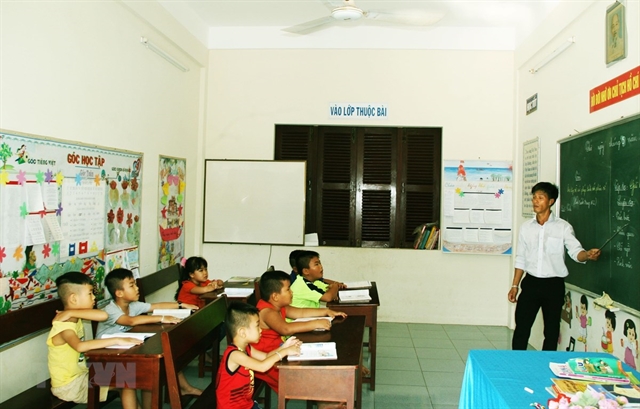 Society
Society

Song Tử Tây Primary School in Trường Sa Archipelago off the coast of Khánh Hòa Province is an educational institution like no other in Việt Nam.

|
| Nguyễn Hữu Phú, principal of Song Tử Tây Primary School gives a lesson to students in Trường Sa Archipelago off the coast of Khánh Hòa Province. — VNA/VNS Photo Trần Quang Vinh |
KHÁNH HÒA — Song Tử Tây Primary School in Trường Sa Archipelago off the coast of Khánh Hòa Province is an educational institution like no other in Việt Nam.
Locating in Song Tử Tây Commune in Trường Sa Archipelago, 500 kilometres from the mainland, the school is the only establishment that offers education for all students ageing between three and 10 in the province.
The students are children of local residents, who mostly work as fishermen. Due to the small number of students and teachers, the school has set up multi-age classrooms to educate students more effectively.
Under Ministry of Education and Training's regulations, multi-age classrooms can have students at two or more different grade levels and no more than total 15 students.
Song Tử Tây Primary School, nevertheless, is special as it has been allowed to combine students from three different grades in a classroom.
Nguyễn Hữu Phú, principal of Song Tử Tây Primary School, said there were a dozen students in the commune, each at different ages.
Thus, the class had to be arranged differently, and there are now just two classrooms, which are used by the only two teachers of the school.
The teachers are in charge of arranging the subjects in the curriculum appropriately so all students can understand the lessons.
Phú said all the students study the same curriculum of subjects such as music and painting. Maths, literature, and science are taught separately.
Phú said the multi-age classrooms bring many advantages for students. Older children get self-esteem and act as role models for younger classmates, while young children aspire to do work like the older children.
Dedicated teachers
Song Tử Tây covers 12 hectares, making it the second largest in Trường Sa Archipelago. Due to its severe natural conditions and a shortage of water, vegetables and meat, only male teachers live and work there.
Nguyễn Hữu Phú and Nguyễn Bá Ngọc are the two teachers who volunteered to move to the island.
Phú said he moved to the island two years ago. On his very first days, he had to learn to do all the jobs which are usually done by female teachers.
“I have learnt the skills of dancing, doing crafts and setting up art performances to bring happiness and joy for students,” he said.
Nguyễn Bá Ngọc said he was assigned to be in charge of pre-school students. As a new graduate and unmarried man, he had to learn every skill to take care of children.
Ngọc said he was confused and embarrassed at first, but things got better soon.
“The children are amazingly studious and obedient. They like to go to school,” he said.
Phú said the lives of the people on the island were tough, but the children always wanted to go to school.
Phú said he was allowed to return the mainland for a month-long holiday this summer, but he would cut it short and come back to the island sooner as there were a lot of jobs that needed to be done before the beginning of the new academic year. — VNS